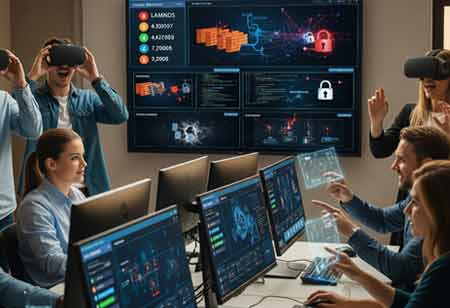THANK YOU FOR SUBSCRIBING
Energy Efficiency in Hotel Design and Operations
The hotel industry is implementing strategies to enhance energy efficiency, reduce operational costs, promote sustainability, and attract eco-conscious travelers, leveraging emerging technologies like IoT and AI.
By
Apac CIOOutlook | Friday, December 06, 2024
Stay ahead of the industry with exclusive feature stories on the top companies, expert insights and the latest news delivered straight to your inbox. Subscribe today.
The hotel industry is implementing strategies to enhance energy efficiency, reduce operational costs, promote sustainability, and attract eco-conscious travelers, leveraging emerging technologies like IoT and AI.
FREMONT CA
Energy efficiency in the hotel industry is more than an environmental responsibility—it is a strategic necessity. By adopting energy-saving measures, hotels can substantially lower operational costs, improve sustainability efforts, and appeal to eco-conscious travelers.
Designing for Efficiency: Building a Sustainable Foundation
Achieving sustainability in hotel design begins with careful material selection, site planning, and operational strategies. Utilizing eco-friendly and energy-efficient building materials reduces the carbon footprint while enhancing energy performance. Optimal site selection, considering solar orientation, natural ventilation, and local climate, minimizes artificial heating and cooling dependency. A well-designed building envelope incorporating high-performance insulation, energy-efficient windows, and airtight construction mitigates heat loss and gain. Integrating daylighting and natural ventilation reduces the need for artificial lighting and air conditioning, while water-efficient plumbing fixtures, such as low-flow faucets and toilets, conserve water and decrease energy usage tied to heating.
Operational Strategies for Energy Savings
Operational efficiencies further reinforce sustainability goals. Advanced HVAC systems with variable speed drives, zoning controls, and energy-recovery ventilators optimize energy consumption. Transitioning to LED lighting and smart systems that adapt to occupancy and daylight reduces energy use. Building automation systems enhance operational efficiency by managing energy-intensive systems in real time based on occupancy and weather patterns. Renewable energy sources, like solar or geothermal power, diversify the energy mix. Educating guests on energy-saving practices, such as reusing linens and switching off unused appliances, fosters a culture of sustainability. Regular maintenance and energy monitoring ensure equipment performs while identifying opportunities for further improvements.
HVAC Systems: Modern HVAC solutions are pivotal in enhancing energy efficiency. Variable Refrigerant Flow (VRF) systems provide precise temperature control for individual rooms or zones, minimizing energy waste. Heat recovery systems optimize efficiency by capturing and reusing waste heat, significantly reducing energy demands. Smart thermostats complement these technologies by adjusting temperatures based on occupancy and time of day, ensuring optimal energy use without compromising comfort.
Lighting Systems: Advanced lighting systems contribute to energy conservation through tailored solutions. Dimming controls adjust light levels to meet the specific needs of different spaces, reducing unnecessary consumption. Daylight harvesting utilizes sensors to detect natural light and automatically adjust artificial lighting, minimizing reliance on electrical sources. Additionally, occupancy sensors enhance efficiency by ensuring lights are only used when occupied spaces.
Water Efficiency: Water management is another critical area for sustainable operations. Water-efficient fixtures, such as low-flow faucets, showerheads, and toilets, reduce water usage and the energy needed for heating. Water metering systems help identify leaks and inefficiencies, enabling targeted interventions for substantial savings. Furthermore, water recycling systems repurpose wastewater for non-potable uses, such as irrigation and toilet flushing, further conserving resources.
Food and Beverage Operations: Sustainability in food and beverage services begins with energy-efficient kitchen equipment, including modern cooking appliances and refrigeration systems, which help reduce overall energy consumption. Food waste reduction initiatives, such as portion control and composting, minimize waste and decrease the energy and water footprint associated with food production and disposal.
Harnessing Emerging Trends and Technologies
Emerging technologies are reshaping energy management in the hospitality sector. Internet of Things (IoT) devices enable seamless connectivity between systems, enhancing operational control and efficiency. AI systems analyze energy consumption patterns, forecast needs, and fine-tune energy usage. Pursuing green certifications, such as LEED or BREEAM, showcases a hotel's commitment to sustainability and attracts environmentally conscious travelers, solidifying its position as a leader in eco-conscious hospitality.
Energy efficiency is a complex challenge that demands a comprehensive approach. By integrating innovative design strategies, advanced technologies, and efficient operational practices, hotels can substantially reduce energy consumption, decrease operating costs, and advance sustainability initiatives. Adopting energy efficiency measures is no longer optional—it is an essential component of the modern hospitality industry's commitment to environmental and economic responsibility.





